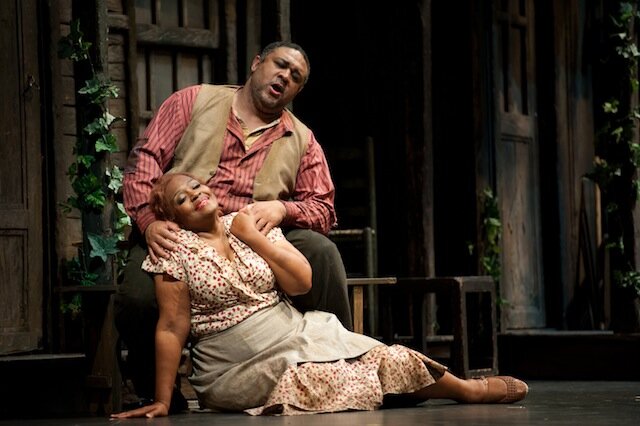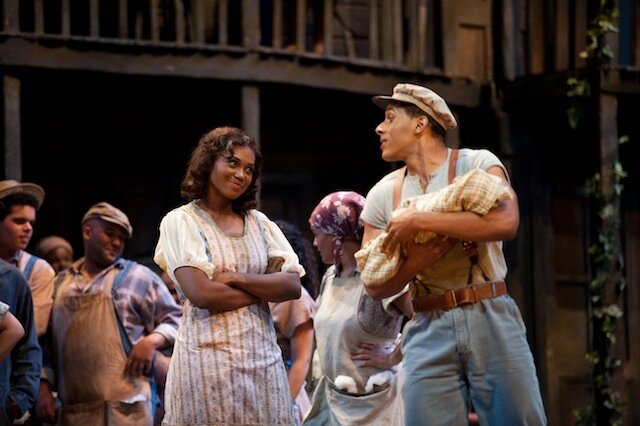This summer’s superb production by Seattle Opera is one nobody should miss. Porgy and Bess (through August 20 at McCaw Hall; tickets here) is the American opera. This is about our country, a small group of our people, and despite it being set 70 years ago, the background is one we all recognize.
We recognize the songs, too: “Summertime,” “Bess, You is My Woman Now,” “It ain’t Necessarily So” are just three arias from Porgy which have found their way into the heads of countless Americans.
For years the opera was considered a hybrid, more a musical, and the recitatives taken out and replaced with speech, perhaps because the subject was homegrown, but George Gershwin who composed it, and Ira Gershwin and DuBose and Dorothy Heyward who wrote the libretto, intended it as a full-scale opera. Since 1976, that’s how it has been regarded, and that is where it belongs.
However, not everyone loves grand opera. Stories are often mythical or historical, set in another country in another era, often in another language (though with supertitles so we can understand what is going on) and not everyone is tuned into what can be a rarified art form.
Porgy and Bess, however, speaks to everyone.
There are 20 singing roles, and in Seattle Opera’s production every one is strong, from the smallest cameo like Strawberry Woman (sung by Ibidunni Ojikutu), to the nine principals. And the chorus! Gershwin gives a huge role to the chorus, and the new young singers who were auditioned last November to be this chorus have delivered in spades.
Gershwin stipulated that the entire cast, bar a few small speaking roles, be black, and in this country that dictum has been faithfully followed.
Seattle Opera’s general director, Speight Jenkins, has said that he wouldn’t present Porgy without the right lead roles, and for this, he was able to bring in a veteran Porgy, baritone Gordon Hawkins, who is no stranger to Seattle Opera (who will forget his Rigoletto?). His acting and powerful singing inhabit the role of this crippled man, though there is a bit wider vibrato these days in his voice. Soprano Lisa Daltirus (remember her as Tosca? Aida?) is his Bess, in a portrayal which shows her as, literally, a troubled, “scarlet” woman who tries to leave her abusive man, goes straight for a while with Porgy, but falls back when forcibly tempted. Her singing Saturday night was at the top of her form, as expressive as ever.
Opening the opera on a qualitative high note which never drops, soprano Angel Blue sings “Summertime” as Clara; soprano Mary Elizabeth Williams, one of Seattle Opera’s former Young Artists, shows that her promise as both singer and actor has arrived at fruition as Serena; tenor Jermaine Smith has impeccable timing, great acrobatics and fine singing as the natty dope peddler Sportin’ Life, while tenor Michael Redding embodies the smoldering menace of Crown, Bess’s dangerous lover; Donovan Singletary provides a beautiful and powerful bass-baritone as Clara’s husband Jake; tenor Michael Austin’s Robbins is yet another voice to be reckoned with., and contralto Gwendolyn Brown held the stage whenever she came to the fore, as Maria.
It’s worth mentioning every one of these singers is a performer it is sheer pleasure to hear, and you hope that they all will be returning to Seattle Opera in the future. All of them, the women particularly, sang with what I can only describe as a glorious green-gold iridescence to their vocal quality.
None of this would have come together as it did without the stage direction of Chris Alexander. He was the novice here, the only one who had never done this opera before, though he knew it well. The close rapport between him and the singers meant he could apply his considerable art at staging while they gave him their take on all sorts of details. The collaboration has been extremely successful.
Today’s digital possibilities added another dimension with the projection of the hurricane on a scrim at the front of the stage. For a while, the orchestra was silent while the fury of the storm and the pounding rain and scudding clouds traveled across the screen, and the sound of the howling winds masked the sound of scene changing behind it. More projections, including the aftermath of the storm with broken fishing boats, added to the overall ambience.
Sets by Michael Scott, lighting by Duane Schuler, and costumes by Christina Giannini all furthered the action, while John DeMain who conducted that first 1976 production of Porgy at Houston Grand Opera, and has conducted many since, did so here with a sure hand and expert pacing, the orchestra negotiating the difficult score with ease, while Beth Kirchhoff achieved miracles with her hardworking chorus.
It’s a fabulous production.








